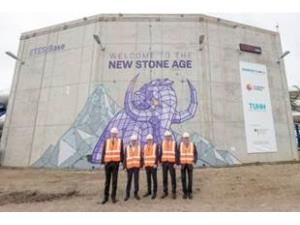



Date:14/06/19
 In an opening ceremony in Hamburg, Siemens Gamesa Renewable Energy SA (BME:SGRE) put into operation an electric thermal energy storage system (ETES) that can store up to 130 MWh for a week using heated rocks.
In an opening ceremony in Hamburg, Siemens Gamesa Renewable Energy SA (BME:SGRE) put into operation an electric thermal energy storage system (ETES) that can store up to 130 MWh for a week using heated rocks.
The commissioning of the facility is a milestone achievement for the wind turbine maker, which has been testing this concept since 2014 starting with 5 MWh of capacity.
While expanded, the ETES project is still in the pilot phase. The system uses crushed volcanic rock weighing 1,000 tonnes as a storage medium. The stones are kept in a thermally insulated container and heated to 750 degrees Celsius with a resistance heater and a blower powered by electricity from the grid. During peak demand, the hot air inside is converted back to electricity by a conventional steam turbine.
There is no loss of capacity throughout the charging cycles.
Siemens Gamesa says it wants to use the pilot plant to test the effectiveness of its heat storage and at a later stage, apply the technology in commercial projects. The goal for the near future is to expand the storage capacity from today’s maximum of 130 MWh to several gigawatt hours. After the testing phase in Hamburg is completed, Siemens Gamesa will initiate a next phase project to bring the storage capacity up to 1 GWh.
The company claims that, theoretically, there is no upper limit to the potential size of the project other than the space needed for the rock-filled container. Decommissioned conventional thermal power plants could house such energy storage units, replacing the furnace and using existing equipment. This ETES can be a commercially viable alternative to pumped-storage hydropower and batteries, according to Siemens Gamesa.
The demonstration project was developed in partnership with the Institute for Engineering Thermodynamics at the Hamburg University of Technology and local utility Hamburg Energie GmbH, which will sell the stored power to the market. The German Federal Ministry of Economic Affairs and Energy provided funding.
Siemens Gamesa commissions volcanic rock-fill energy storage
 In an opening ceremony in Hamburg, Siemens Gamesa Renewable Energy SA (BME:SGRE) put into operation an electric thermal energy storage system (ETES) that can store up to 130 MWh for a week using heated rocks.
In an opening ceremony in Hamburg, Siemens Gamesa Renewable Energy SA (BME:SGRE) put into operation an electric thermal energy storage system (ETES) that can store up to 130 MWh for a week using heated rocks.The commissioning of the facility is a milestone achievement for the wind turbine maker, which has been testing this concept since 2014 starting with 5 MWh of capacity.
While expanded, the ETES project is still in the pilot phase. The system uses crushed volcanic rock weighing 1,000 tonnes as a storage medium. The stones are kept in a thermally insulated container and heated to 750 degrees Celsius with a resistance heater and a blower powered by electricity from the grid. During peak demand, the hot air inside is converted back to electricity by a conventional steam turbine.
There is no loss of capacity throughout the charging cycles.
Siemens Gamesa says it wants to use the pilot plant to test the effectiveness of its heat storage and at a later stage, apply the technology in commercial projects. The goal for the near future is to expand the storage capacity from today’s maximum of 130 MWh to several gigawatt hours. After the testing phase in Hamburg is completed, Siemens Gamesa will initiate a next phase project to bring the storage capacity up to 1 GWh.
The company claims that, theoretically, there is no upper limit to the potential size of the project other than the space needed for the rock-filled container. Decommissioned conventional thermal power plants could house such energy storage units, replacing the furnace and using existing equipment. This ETES can be a commercially viable alternative to pumped-storage hydropower and batteries, according to Siemens Gamesa.
The demonstration project was developed in partnership with the Institute for Engineering Thermodynamics at the Hamburg University of Technology and local utility Hamburg Energie GmbH, which will sell the stored power to the market. The German Federal Ministry of Economic Affairs and Energy provided funding.
Views: 476
©ictnews.az. All rights reserved.Similar news
- Azerbaijani project to monitor disease via mobile phones
- Innovative educational system to be improved under presidential decree
- NTRC prolongs license of two TV and radio organizations for 6 years
- Azerbaijan establishes e-registry for medicines
- Azerbaijani museum introduces e-guide
- Nar Mobile opens “Nar Dunyasi” sales and service center in Siyazan city
- International conference on custom electronic services held in Baku
- OIC secretary general to attend COMSTECH meeting in Baku
- Azerbaijan develops earthquake warning system
- New law to regulate transition to digital broadcasting in Azerbaijan
- Azerbaijani State Social Protection Fund introduces electronic digital signature
- Intellectual traffic management system in Baku to be commissioned in December
- Tax Ministry of Azerbaijan started receiving video-addresses
- World Bank recommends Azerbaijan to speed up e-service introduction in real estate
- Azerbaijan to shift to electronic registration of real estate





















